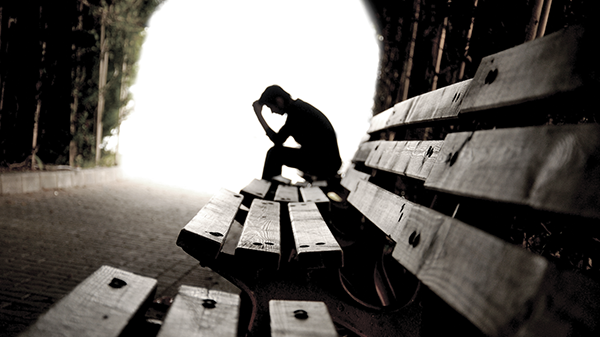
–Abraham Lincoln
If you’re sitting there thinking: “Bullshit! I’m depressed. I can’t make myself happy.” Then, we completely understand where you’re coming from. Depression is real, it’s biochemical and if you clicked on this icon, then it’s happening to you or someone you love right now. How do you know if you are depressed? For some people (often men) depression can present itself as anger and irritability. We’ve worked with many people who have said, “I don’t feel depressed or blue. I’m not sad but I am so, so mad. I get angry at the slightest things. There is a rage inside of me ready to be unleashed.” Does that sound like you?
Generally speaking, depression is a persistent feeling of sadness. Though it can vary, people have some combination of the following symptoms: wanting to isolate and not leave the house or see friends, not experiencing pleasure in the things they used to, difficulty making eye contact, feelings of worthlessness, negative self-talk (I am a bad person. I am so stupid. I should not have done this. My life is a waste.), finding fault in others, intractable sadness, difficult sleeping, lack of energy, trouble concentrating.
You experience cognitive distortions, your style may be: all or nothing thinking, catastrophic thinking, shoulds, blaming, focusing on the unfairness of life.
When you are depressed, you can’t simply “snap out of it” though you can start to change behaviors, then emotions and thoughts follow. Research has shown that new neural pathways in our brains are formed when we participate in certain new activities and these newly generated neural pathways fight off depression. They also change when we experience empathy from a listener (like a therapist).
When we take medication for depression, new neural pathways are formed as well, often more quickly than with new behaviors, but it is a similar process.
For instance, exercise has been proven to form new neural pathways. Simply taking a new route to work forms them too. Playing a new game, like ping pong, can form them. We are learning that there is much more neuroplasticity in the brain than we ever thought possible before. Translation: we can change our brains!
Think of a triangle with behaviors at the top point and thoughts and emotions on the two bottom points. All of these points influence each other. Therapy encourages you to change your behaviors so that emotions and thoughts change too. In other words, when we are feeling depressed we lack motivation and find it hard to complete day-to-day tasks. Even showering might feel monumental. If you start to make a list of behaviors you will engage in (small steps, nothing huge) then you will start to see a shift in your mood.
What is anxiety and how does it fit in with depression?
Let’s think of depression and anxiety as little friends/enemies (frenemies?) who come to visit you sometimes. There is no point in pushing them away. It’s like trying to hold a basketball underwater, it just doesn’t work and in time the basketball will come to the surface with an impressive force, smacking you in the face! You simply cannot force your emotions to stop, you cannot will depression and anxiety away and pretend they do not exist. You can for a while but that usually makes it worse. (Emotions are not unlike blinking.)
Anxiety causes insomnia, heart palpitations, panic attacks, lots of worry and uneasiness, agitation. You just can’t sit still. You need to do something all the time, every minute, every second. You experience a surge of energy yet you are drained at the same time. Worry about the future, dread about the past, things that never bothered you before are really upsetting you. You might fixate on a certain person or issue. It is horrible. So is depression.
One person described it this way:
Remember: depression can occur as an outcome of overly stressful events. Everyone has limits. Once you experience two to three episodes of event-related depression, it can visit you for no outward reason. This means, there is a biochemical reaction in our brains. We can become hardwired for depression. The good news is that if we start therapy, change our behaviors (nothing major, small steps), become accountable to someone, we can change.
Get support, experience insights, make real changes. You don’t have to suffer alone with depression or anxiety. Don’t believe the lies depression and anxiety tells you. We are all more vulnerable to these lies at certain points in life. Of course it is not easy and at times medication is necessary. We will help you make that decision.


